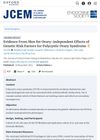 June 2020 in “Applied sciences”
June 2020 in “Applied sciences” A new semi-automatic hair implanter could make hair transplants easier, more successful, and more accessible.
 November 2018 in “Springer eBooks”
November 2018 in “Springer eBooks” The document concludes that hair transplant clinics should focus on effective marketing, online presence, and quality patient care, while the industry should promote high standards and education through organizations like FUE Europe.

Modern hair restoration techniques can effectively treat hair loss and provide natural-looking results.
 May 2013 in “Trends in Urology & Men's Health”
May 2013 in “Trends in Urology & Men's Health” Male-pattern hair loss is normal, often involves hormone effects on hair follicles, and can be treated with medication or surgery, but new treatments are being researched.
 January 2013 in “Springer eBooks”
January 2013 in “Springer eBooks” Hair care products are important for appearance and self-esteem, and choosing the right ones can help maintain healthy hair.
 22 citations,
March 2021 in “European journal of endocrinology”
22 citations,
March 2021 in “European journal of endocrinology” Primary amenorrhea and delayed puberty in females can be diagnosed and managed effectively.
 11 citations,
November 2021 in “The Journal of Clinical Endocrinology and Metabolism”
11 citations,
November 2021 in “The Journal of Clinical Endocrinology and Metabolism” Genetic risk factors for Polycystic Ovary Syndrome can affect men too, not just women.
 8 citations,
August 2023 in “The Journal of Clinical Endocrinology and Metabolism”
8 citations,
August 2023 in “The Journal of Clinical Endocrinology and Metabolism” Follow the latest international guidelines to assess and manage Polycystic Ovary Syndrome effectively.
3 citations,
October 1993 in “Endocrinology”  2 citations,
August 2023 in “Human Reproduction”
2 citations,
August 2023 in “Human Reproduction” The document provides updated advice on how to diagnose and treat polycystic ovary syndrome.
2 citations,
July 2021 in “The Journal of Sexual Medicine” Gene expression differences in PFS patients suggest a potential organic cause for symptoms.
 1 citations,
July 2022 in “Clinical and Experimental Dermatology”
1 citations,
July 2022 in “Clinical and Experimental Dermatology” Menopause can cause hair problems.
 October 2023 in “Journal of the Endocrine Society”
October 2023 in “Journal of the Endocrine Society” Estetrol helps keep scalp hair in the growth phase longer and improves hair follicle health by affecting the hair root and increasing stem cells.
 October 2023 in “Journal of the Endocrine Society”
October 2023 in “Journal of the Endocrine Society” Machine learning identified three unique subtypes of androgen excess in women with PCOS, each with different metabolic risks.
 June 2023 in “British Journal of Dermatology”
June 2023 in “British Journal of Dermatology” British royals have had a notable history of skin problems.
 June 2023 in “British Journal of Dermatology”
June 2023 in “British Journal of Dermatology” A person with Werner syndrome was initially thought to just have female pattern hair loss.
 June 2023 in “QJM: An International Journal of Medicine”
June 2023 in “QJM: An International Journal of Medicine” Diagnosing diffuse alopecia is challenging due to its varied appearance and underlying causes.
 June 2023 in “British Journal of Dermatology”
June 2023 in “British Journal of Dermatology” The prototype for analyzing skin aging works technically and clinically.
 June 2023 in “British Journal of Dermatology”
June 2023 in “British Journal of Dermatology” The protein called small nuclear ribonucleoprotein polypeptide E is identified as a cause of a type of hair loss without other symptoms.
 October 2022 in “Regenerative Biomaterials”
October 2022 in “Regenerative Biomaterials” A special gel with stem cells can create new hair follicles.
 October 2021 in “QJM: An International Journal of Medicine”
October 2021 in “QJM: An International Journal of Medicine” The experiment successfully created a 3D model of a rat lung using a natural scaffold.
 October 2021 in “QJM: An International Journal of Medicine”
October 2021 in “QJM: An International Journal of Medicine” People with severe hair loss have higher levels of a protein called interleukin 17 in their blood.
 September 2021 in “International Journal of Epidemiology”
September 2021 in “International Journal of Epidemiology” The study concluded that examining the scalp with a special magnifying device helps diagnose the cause of widespread hair loss in adult women.
December 2022 in “British Journal of Dermatology” October 2022 in “British Journal of Dermatology” September 2022 in “Medical Mycology” Scalp fungi and sebum differences may affect hair loss in men.
September 2022 in “Medical Mycology” Malassezia fungi may contribute to hair loss and inflammation in androgenetic alopecia.
July 2022 in “British Journal of Dermatology” July 2022 in “British Journal of Dermatology” July 2022 in “British Journal of Dermatology”




















